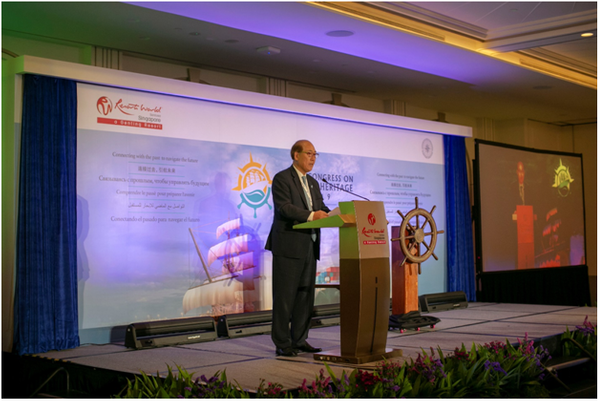
A three-day meeting of maritime industry, government leaders, scientists and scholars was held in Singapore to explore the intersections and impacts of maritime heritage.
Organized by the Consortium for International Maritime Heritage (CIMH) the key message from this first World Congress on Maritime Heritage is a simple one: the oceans are in trouble and if the oceans are in trouble, so too is the earth. We breathe oxygen produced by the sea and the sea mitigates the impact of inadequately controlled CO2 emissions. This is a water planet, with two-thirds of the earth covered by it. The Congress, held at Resorts World Sentosa in Singapore, examined the fundamental importance of the oceans to every facet of human life.
The impact of maritime on society is pivotal. Humanity spread across the globe by taking to the sea starting tens of thousands of years ago. What then followed was the gradual creation of today’s global economy. In the 21st century, ninety percent of the world’s goods go by sea. Global maritime heritage reflects more than the story of trade goods and voyages. It is a story of connections, the sharing of cultures, and diversity. Migration and trade have been the drivers for improving the quality of human life. One key message, drawn from maritime culture, is that humanity needs to work together, collectively, to face its challenges at a time when some voices call for isolation and barriers.
“The Congress represented an increasing commitment of maritime industries and communities around the world to find new ways to contribute to solutions with others for ensuring a sustainable future” observed Terry Garcia, Congress Chairman. “The Congress proposed the idea of considering the historic evolution of maritime industries and communities as an additional catalyst for building new coalitions. This will be effected in regional gatherings yearly and a second Congress to take place in two years.”
The impact of planet health is being felt universally. In the past, at the end of the last great Ice Age, the oceans rose dramatically, drowning ancient coastlines and human settlements. The oceans are again rising, and on a more crowded planet, hundreds of millions will lose their homes. As the world floods, the areas not drowned will face a massive influx of refugees. This pending global crisis requires planning and action now.
While for tens of thousands of years humans relied on the oceans and our culture was influenced by them, we now live in an era where the oceans respond to us. Humanity’s relationship with the ocean is changing. A key message of the Congress is that generally speaking, the majority of people have forgotten their maritime heritage and this lack of respect is threatening the ocean's life sustaining role. It is not yet too late to reverse these damaging impacts, to preserve the beauty of the oceans for our children and for the continuation of our civilization. Nevertheless, time is quickly running out.
The follow on to the 1st World Congress on Maritime Heritage is the planning of regional events in between a biannual World Congress. The CIMH Organizing Committee will soon be reviewing proposals from host organizations to hold the 2nd World Congress, as well as interested groups to host the regional meetings in 2020.




